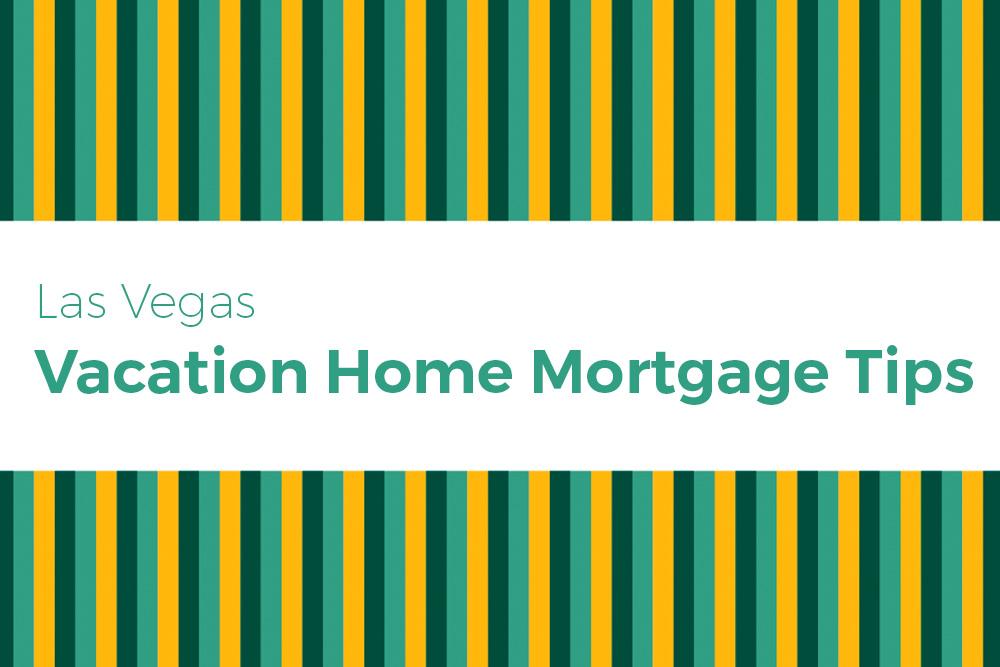Las Vegas Vacation Home Mortgage Tips

With its sunny days, exciting nightlife, shopping, and many other attractions, it’s no surprise that Las Vegas, Nevada is a top destination for a vacation. Some people decide they like the city so much that they never want to leave! If you are one of those individuals considering getting a vacation home in Las Vegas, there are some important details you’ll want to know about the housing market before you set out making an offer on your dream property. A loan officer in Las Vegas can tell you all about the current market and mortgage rates so that you can make an informed and satisfying decision.

Vacation Home Mortgage Rates – Is now the Time to buy in Las Vegas?
Many people wonder if now is the time to get a vacation home in Las Vegas. Market conditions change frequently, which affects your purchasing power and can make the difference between whether you decide to buy a home now or wait. Currently, vacation home rates and fees are increasing in Las Vegas because the Fannie Mae and Freddie Loan Level Price Adjustment (LLPA) is going up. That means purchasing power is changing in Las Vegas, Nevada, and a handful of other states. Deciding whether this is a good time to invest in a second home is largely a personal choice depending on your tolerance for risk and financial circumstances.

What To Know Before You Buy
If you’ve decided that now is the right time that you’d like to get a second home in Las Vegas, there are several vital steps to take and considerations to keep in mind to ensure you get the right property and that your home purchase is a success.
Save Early
As with buying a first home, it’s essential to ensure you have sufficient savings before looking at vacation homes. When you add up all the expenses that go into determining how much the home will cost, you’ll discover that you will need to have a sufficient amount of cash available for the initial up-front costs, which include:
- Down payment
- Closing costs
- Moving expenses
- Appraisal and inspection fees
The down payment on your home can range from 3% – 20% of the home’s purchase price. If you can afford to put 20% down, you won’t need to worry about an additional expense called private mortgage insurance (PMI), which is a fee that you will need to pay if you make less than a 20% down payment. The PMI is designed to protect the lender if you default on your loan payments. The closing costs include the fees and expenses you need to pay to close the transaction on your home and finalize your mortgage. Closing costs vary, but they generally range from 2% – 5% of the total loan amount.
Additionally, the seller will sometimes pay for part of the closing costs, which reduces the overall amount that you must pay. The appraisal fees and inspection fees will also need to be factored into the total of your vacation home. Finally, all the expenses associated with moving should also be considered when buying a house.
During the process of buying a home, you’ll need to determine how much house you can afford. That involves considering your credit score, down payment size, debt, income, and current mortgage rates in Las Vegas. It is best to figure out how much you can spend on a home, as you will be able to search for homes in your price range.

Check Your Credit Score
When you buy a second home, as with a first home, most mortgage lenders in Las Vegas will require you to have a credit score in a specific range. You will generally need a minimum credit score of 620 for a conventional loan. If your credit score is below that level, you can do a few things to fix it. One easy fix is to make sure that all your bills are paid in full and on time. Paying off any outstanding debt can also make your credit score better. Don’t open any new credit card accounts when looking for a second home, as that can negatively impact your credit rating. If you think that your credit score looks lower than average, or if you have not checked your credit score in some time, it’s a good idea to make sure there are no errors in your credit report that have made the number appear lower than average. (Read more on refinancing with bad credit here.)
Find a Good Vacation Home Mortgage Rate
There are several different kinds of mortgages that you can get for a second home. Some of the most popular mortgages are:
- FHA loans
- Conventional mortgages
- VA loans
- USDA loans
An FHA loan is administered by the Federal Housing Administration (FHA). FHA loans are a popular choice for people with higher credit scores, as they allow you to make a much lower down payment of 3.5% if you have a credit score of 580 or higher. However, you generally need to pay a mortgage insurance premium (MIP) with an FHA loan to protect the lender in case you default. Even if you have a credit score below 580, you can still apply for an FHA loan, but you will likely need to make a larger down payment.
Conventional loans carry a term of 15 to 30 years. A conventional loan is generally backed by Fannie Mae or Freddie Mac and can be either a fixed-rate or a variable-rate loan. The category can encompass many types of loans.
VA loans, or Veterans Affairs loans, can help specific individuals purchase or make improvements to their homes. VA loans appeal to those who cannot afford a standard down payment, as most loans allow consumers to buy a home with little or no down payment.
The U.S. Department of Agriculture administers a USDA loan. Most USDA loans are also zero-down loans offered to people purchasing homes in rural locations.
If you have questions or want help deciding what kind of loan to get, mortgage lenders in Las Vegas can be a great resource.
Shop Around for Lenders
Just as you wouldn’t expect to find the same prices in different gas stations or grocery stores, the same concept applies to mortgage lenders in Las Vegas. To have a point of comparison, you should first decide on the type of loan you want to get and then compare the exact mortgage cost from different lenders. The interest rate and origination fees can also be considered. Lenders may also offer the option of discount points, which give the borrower the option of paying more money upfront to get lower interest rates in return.
Choosing the Right Location
Financial factors aside, making sure you get a home in the location you want is essential. If you are buying a vacation home in Las Vegas, you may also be considering renting out the house when it’s not in use. Location is also crucial to renters and proximity to conveniences and attractions. Las Vegas has many diverse neighborhoods, so you will want to choose the one with the right personality.
Contact a loan officer in Las Vegas today to find out more about buying a vacation home in Las Vegas and determining if now is the right time.









